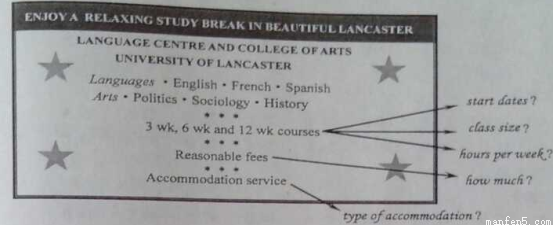题目内容
根据短文内容, 从短文后的选项中选出能填入空白处的最佳选项。选项中有两项为多余选项。
Tips for Cooking on a Tight Schedule
From my experience , there are three main reasons why people don’t cook more often :ability , money , and time 1. .Money is a topic I’ll save for another day .So today I want to give you some wisdom about how to make the most of the time you spent in the kitchen .Here are three tips for great cooking on a tight schedule :
Think ahead .The moments when I think cooking is a pain are when I’m already hungry and there’s nothing ready to eat .So think ahead of the coming week .When will you have time to cook ?Do you have the right materials already ? 2. .
Make your time worth it .When you do find time to cook a meal , make the most of it and save yourself time later on .Are you making one loaf of bread ? 3. .It takes around the same amount of time to make more of something .So save yourself the effort for future meal .
4. This may surprise you , but one of the best tools for making cooking worth your time is experimentation .It gives you the chance to hit upon new ideas and recipes that can work well with your appetite and schedule. The more you learn and the more you try, the more ability you have to take control of your food and your schedule.
Hopefully that gives you a good start. 5._______ And don’t let a busy schedule discourage you from making some great changes in the way you eat and live!
A. Try new things.
B. Ability is easily improved.
C. Make three or four instead.
D. Understand your food better.
E. Cooking is a burden for many people.
F. Let cooking and living simply be a joy rather than a burden.
G. A little time planning ahead can save a lot of work later on.
1.B
2.G
3.C
4.A
5.F
【解析】
试题分析: 本文是说明文体裁。作者在文中介绍了一些如何在繁忙的时间内享受做饭带来的乐趣。作者认为人们不经常做饭的原因有三个方面:能力,钱和时间。作者着重介绍了时间方面的问题,他认为要提前做好计划;要让时间花的有价值而且要人们经常去尝试新的想法和新的菜谱。
1.考查上下文的语境理解。在上文中作者提出人们不做饭的原因有能力,金钱和时间等原因,然后再空后介绍了金钱和时间问题,由此判断空格上内容是作者对能力的介绍,纵观选项B选项内容(能力是很容易提高的)符合语境,故答案选B。
2.考查上下文的语境理解。本段主题句是Think ahead,让人们要提前有计划,提前做好安排,这样做饭就不是件痛苦的事情了,所以判断G选项内容(提前一点时间做计划可以节省以后的很多时间)能够承接上文,选G。
3.考查上下文的语境理解。在前面作者提到要让时间花的更值得,提出问题.Are you making one loaf of bread ? 而且下文提到在同样多的时间内要多做几个面包,所以判断C选项内容(要做三、四个面包)能够起到承上启下的作用,答案选C。
4.考查语境理解及主题句。在本段中作者提到要多去尝试新的菜谱和新的想法,这样能力就越来越高,所以A选项内容(尝试新事物)可以概括本段中心,选A。
5.考查上下文的语境理解。在上文中作者给人们建议如何在繁忙的生活中寻找做饭的快乐,再根据空格后内容:不要因为紧张的时间安排而不能去享受生活,可以判断F选项内容(要让做饭和生活成为一种乐趣而不是负担)符合语境,选F。
考点:考查信息匹配。

 天天向上一本好卷系列答案
天天向上一本好卷系列答案 小学生10分钟应用题系列答案
小学生10分钟应用题系列答案